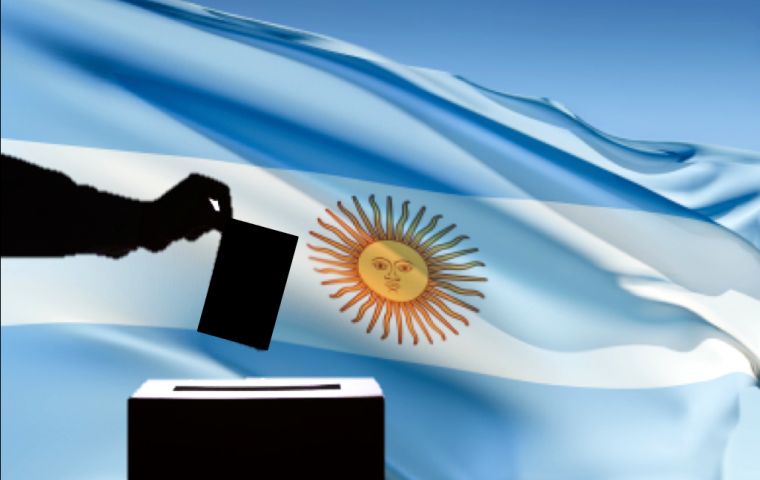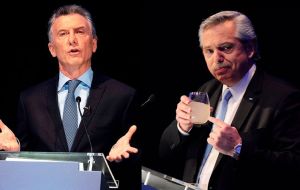MercoPress. South Atlantic News Agency
Argentine ready for the return of Kirchnerism defeated by Macri in 2015
 “The election is basically over, there’s just a small chance of some surprise, but it’s highly unlikely,” said Buenos Aires-based political analyst Sergio Berensztein
“The election is basically over, there’s just a small chance of some surprise, but it’s highly unlikely,” said Buenos Aires-based political analyst Sergio Berensztein  However a strong showing from Macri would send a message to Alberto Fernandez and his coalition that there is a strong opposition looking ahead to 2021 and 2023
However a strong showing from Macri would send a message to Alberto Fernandez and his coalition that there is a strong opposition looking ahead to 2021 and 2023  Argentine voters will be choosing among six presidential candidates, with 130 Deputy roles and 24 Senate positions up for grabs in Congress
Argentine voters will be choosing among six presidential candidates, with 130 Deputy roles and 24 Senate positions up for grabs in Congress Argentines head to the polls on Sunday with the Peronist opposition strong favourites to take back the presidency from business-friendly reformer Mauricio Macri, who has been stung by a tumbling economy and financial crises.
In cities around Argentina, polling stations will open at 0800 for the Oct. 27 vote, with center-left candidate Alberto Fernandez holding an seemingly unassailable 20-point lead in most polls. He soundly beat Macri in an August primary, sparking a sharp market crash.
“The election is basically over, there’s just a small chance of some surprise, but it’s highly unlikely,” said Buenos Aires-based political analyst Sergio Berensztein. A strong Macri showing, even in defeat, could though be significant.
“That would send a message to Alberto Fernandez and his coalition that there was a strong opposition group who could be competitive in the next elections in 2021 and 2023.”
Argentine voters will be choosing among six presidential candidates, with 130 Deputy roles and 24 Senate positions up for grabs in the country’s two-house Congress, where Fernandez’s coalition is expected to do well.
Voters in Buenos Aires province, the heart of a populous region that has almost 40% of the total electorate, point to rising poverty - now above 35% - and inflation that is squeezing working and middle-class families.
Many in the wealthy capital, Buenos Aires City, which has generally favored Macri, said they would stick by the president, despite the economic woes. Macri held a march in the city last week, attracting huge crowds as he looked to win back “angry” voters under the slogan, “Yes we can, yes we can turn the election around”.
However, even among his supporters plenty were less than enthusiastic - a sign of how far the business magnate-turned-politician has fallen since his win four years ago, when he was the outsider breath of fresh air.
To win the presidency in the first round, a candidate needs at least 45% of the vote, or 40% and a 10-point lead over the second place runner. If no clear winner emerges, voters will return for a run-off on Nov. 24. So, who are the main runners?
Mauricio Macri swept to power in 2015 pledging to modernize and reform Latin America’s No. 3 economy, give markets a freer rein and open the doors to more liberal global trade.
In some aspects he has succeeded: he helped strike trade deals for the regional Mercosur bloc with Europe, forged closer ties with global investors and helped ramp up the country’s energy sector after years in the doldrums.
However, crisis struck in 2018, when drought gobbled half the country's hard money earning crop and his dependence on foreign capital influx to pay for much of the subsidies policies inherited from the Kirchner years. Besides tail winds ceased and soy beans dropped to US$ 300 a ton, compared to US$ 600 with ex president Cristina Fernandez de Kirchner.
This forced Macri to go hat-in-hand to the International Monetary Fund for a US$ 57 billion loan, the biggest ever from the lender. He has struggled to recover since, with high inflation, almost constant recession and a plunging peso hurting his support with voters across the board.
He had, however, appeared to be making something of a comeback earlier this year as economic woes eased and he struck an import alliance with influential Peronist Miguel Angel Pichetto, his current running mate, to broaden his appeal.
While likely to lose, Macri could potentially point to a bright side. He would be the first non-Peronist president to complete his term since the middle of the last century.
Alberto Fernandez, a savvy political operator and former chief of staff, emerged from the shadows less than six months ago to become the unexpected main challenger to Macri with the “Front for All” party.
A university professor and moderate with the nebulous Peronist political arch flank, Fernandez is seen as a consensus builder, in contrast to his divisive, higher-profile running mate, Cristina Fernández de Kirchner.
The sitting senator on the bottom of the ticket is loved and loathed by Argentine voters in near equal measure. She is facing a string of court cases linked to allegations of corruption, which she strongly denies, but has an ardent core following and commands rock-star crowds at events - including as she has toured promoting her new book, “Sincerely.”
Intelligently she nursed relations with Pope Francis, whom she loathed when Jorge Bergolio was archbishop of Buenos Aires, because he kept denouncing poverty. It is believed that promoting a ticket headed by a “bridge builder”, such as Alberto Fernandez, and with her (and her divisive character) in second place would ensure the return of the populist rulers to the main electoral circuit of Argentina and decisive for any winning candidate. A shared victory over neo-liberal economic policies, which Cristina and Francis believe is the evil of evils.
Roberto Lavagna is an economist and former economy minister under Néstor Kirchner, the late husband and predecessor of Fernández de Kirchner. His campaign had looked to capture the middle-ground vote angry with Macri but worried about returning to populism.
That strategy fell apart, however, after the Fernández de Kirchner stepped back, instead installing moderate Alberto at the head of the Peronist ticket and taking a back seat.
Lavagna, 77, is the oldest of the three main candidates, a fact which has been used against him by rivals to suggest he is out of touch with the country’s younger generations.
He is running with younger regional governor Juan Manuel Urtubey, a centrist Peronist who had advocated for a more moderate “non-Kirchnerist” opposition to defeat Macri, and is obviously with his mind most probably in 2023. .




Top Comments
Disclaimer & comment rulesCommenting for this story is now closed.
If you have a Facebook account, become a fan and comment on our Facebook Page!